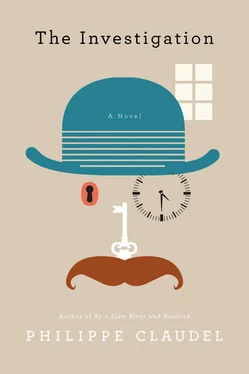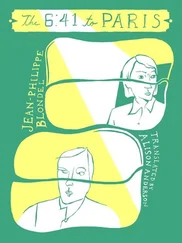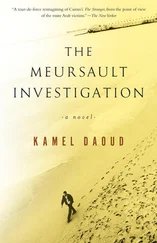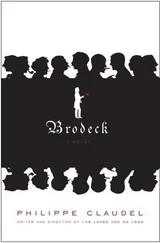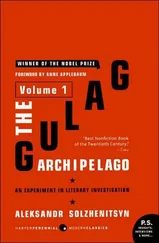As if to illustrate all those unaccustomed thoughts, grating on a brain accustomed to less effort, the Investigator sprang to his feet, seized the back of the demolished chair, and used it to complete the destruction of the premises, reducing the neon tube to glass powder, shattering the telephone’s plastic shell, smashing the armoire, disemboweling mattress and eiderdown. He finished the job by taking hold of what remained of the night table, throwing it against the window — glass shards showered down on the devastated bed — and methodically laying waste whatever was intact in the room. Then he stopped, a little out of breath, but perfectly happy.
A violent energy, risen from unsuspected depths, electrified him. For the first time in his life, he’d performed a gratuitous act, and he wasn’t at all sorry. On the contrary, when he imagined what the Policeman’s face would look like when someone showed him the battlefield, the Investigator laughed a good deal. He’d decided that he was going to take back control of the situation, whatever it might be. He had an Investigation to conduct, and he would conduct it. He wasn’t going to let a few fairly deranged individuals, an impossible hotel, a shameless old man, a hostile city, and an enterprise, even the Enterprise itself, get the best of him. Wrecking his room was an affirmation of his freedom. History, he thought, crushes only those who are willing to be crushed.
He cleaned himself as best he could, using his sheet to remove from his skin the hardened, cracked, whitish crust left there by the Mauve Lilac. He opened his suitcase to take out some clean clothes. The fact that it contained a drill, a set of bits for wood, another set for metal, and a third for concrete, along with five pairs of women’s underpants, two brassieres, a Bible in Dutch, some apple-green sweatpants, a pair of rubber boots, a canary-yellow woolen dress, and three handkerchiefs that he recognized as his own, failed to diminish his newly regained vitality in the least. The Bellhop who’d cleared out his former room — as he had doubtless done with many others — had simply mixed up the personal belongings of several different Guests and then redistributed them at random to the various suitcases.
Without the slightest embarrassment, the Investigator slipped on a pair of the panties — pink synthetic fabric, with a delicate black lace trim — the jogging pants, the boots, and the yellow dress, which when sliced in half was miraculously transformed into a pleasantly warm sweater. After some little hesitation, he ultimately decided to leave the drill in the suitcase, telling himself that the tool would be more an encumbrance than anything else. On a hook fastened to the inside of the door, he found his raincoat, which someone had hung there. It had been cleaned and pressed, and it was protected by a thin plastic cover. An expert, faithful hand had mended the torn pocket and the big rip on the side. A piece of paper was pinned to the raincoat: With the compliments of the Management .
His heart was beating a hundred miles an hour. Throughout his body, he felt electric discharges contracting his muscles, including those of his face and eyelids, surprisingly and deliciously. It promised to be a fine day, he was certain of it. He was no longer simply a vapid, weak, drab character, profoundly distressed by a sequence of events he couldn’t understand. He was no longer just the Investigator. He was becoming a hero. He’d emancipated himself, he’d rebelled, he’d seized the power he’d been denied. The mouse would kill the cat. Chemistry was working miracles in him.
He left the room, violently slamming the door; the doorknob remained in his hand. He bounced it on his palm for a few seconds, negligently, rather like a fruit he was about to bite, and threw it over his shoulder, whistling. Then he went down the uneven stairs, two by two, on his way to the breakfast room.
YOU’RE IN ROOM 93?” asked a Server wearing white tails and black pants.
“Absolutely!” the Investigator heard himself reply, in a revivified voice. With a gesture, the Server invited him to follow.
The breakfast room was once again packed with people, but the Investigator recognized that they weren’t the same as those who’d filled the room the previous day. This morning there were a lot of families, with children of all ages, including infants, and also many very old persons. They were all poorly dressed, in clothes that were often far from ordinary: Many of the men wore enormous, shabby robes that trailed on the ground, big, threadbare sheepskin jackets, or faded, sleeveless anoraks; the majority of the women had on black, cone-shaped coats, buttoned down the front from throat to feet. Headgear included knotted scarves, handmade ski caps, fur hats, felt toques, seedy-looking berets, decrepit bowlers.
The people were all tightly clutching bundles, or distended, pathetic imitation-leather gym bags, or cardboard boxes tied up with string, or enormous plastic sacks, many of them held together with brown adhesive tape, or ancient pasteboard suitcases that looked to be at the bursting point. Most of the individuals shared physical traits: angular faces, small stature, pronounced noses, olive or frankly gingerbread complexions, dark curly hair, mauve-circled eyes that their evident state of exhaustion made seem even larger.
It was a welter of bodies.
The Investigator couldn’t get over it. There were even more people than there had been the previous day. It seemed that the floor must crack under their weight. And what struck him with even greater force was the heavy silence that reigned in the spacious room. Those women, those men, those children, those old people — it was as if fatigue had sealed their lips and suppressed their desire to communicate.
They looked like peasants or workers or day laborers or farmhands from another century, beasts of burden whose bodies, unceasingly subjected to undernourishment and the law of work, were compelled to make do with their meager bones and the bit of flesh that covered them. Everything about the breakfast throng betrayed poverty, indigence, as well as the dread which that condition — no doubt undergone for decades or even centuries — had succeeded in depositing at the deepest level of their every movement, of every look in their eyes, like a genetic trait it’s no use struggling against. The same mark, the mark of the downtrodden, was imprinted on each of those creatures. But nothing allowed the observer to identify their origins unequivocally or to name the exact country they came from.
Most of them were gathered in dense clusters around tables intended to seat four. For lack of room, skinny children sat on the laps of adults scarcely bigger than they were. They were nibbling on rusks the Investigator recognized, rusks identical to the appalling things he’d been obliged to consume the previous morning, and next to them stood little cups of black coffee, scantily filled with a muddy brew the mere memory of which nauseated him. So all those people, every one of them inhumanly thin whatever their age or sex, nevertheless had to subsist on the same starvation diet.
“Tourists?” the Investigator inquired.
“You must be joking!” the Server replied. “Them, Tourists? Have you taken a good look at them? Have you got a whiff of them?”
“Please, not so loud, they could hear you!” the Investigator murmured.
“They can’t understand us, they’re not from here. I don’t know what language they speak, but it’s not ours, that’s for sure. They’re Displacees.”
“Displacees?”
“Yes, Displacees!” And when the Investigator seemed surprised, the Server took it upon himself to add, “What planet do you live on? For several months now, they’ve been getting turned away in droves, but they keep coming back, and there are always more of them. Have you noticed how many children those women put out? If we could avoid having anything to do with them, we would, but the Hotel is requisitioned by the Repatriation Service, practically every other day. Look at them. Do you think they’re unhappy? They’re just different, that’s all. I hate difference. And I love disinfectants. Take yourself, for example: You smell particularly good, so I’m favorably inclined toward you. Anyway, I was able to save you a table — it’s right over there. Management has asked me to express their deep regrets for exposing you to this unseemly spectacle and this disagreeable odor. I’ll be back in a moment with your breakfast.”
Читать дальше
